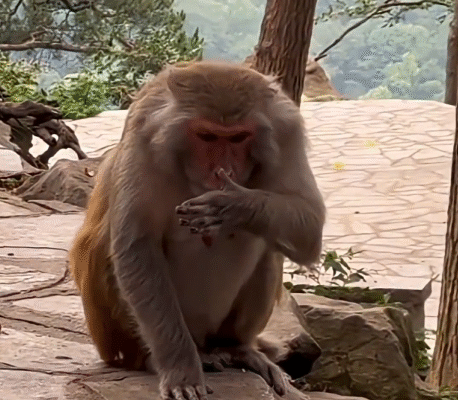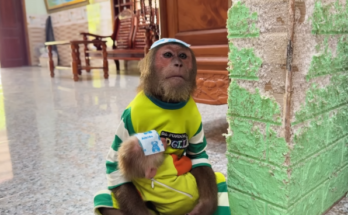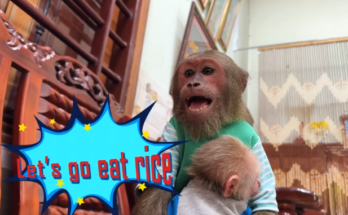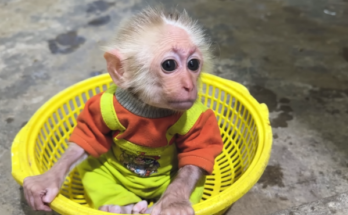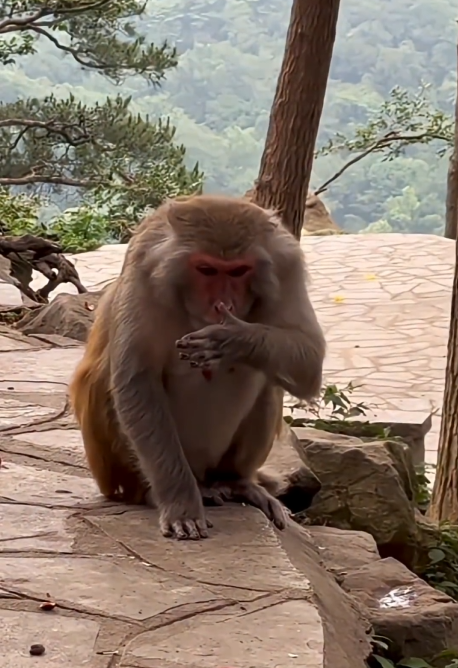
It was a sunny afternoon in the small village where life moved at its own gentle pace. The market was bustling with people buying fresh vegetables, fruits, and other daily necessities. Children ran about laughing, vendors called out their prices, and the smell of freshly baked bread mixed with the earthy scent of the river nearby. Among all this, a young boy named Tien was carrying a small loaf of bread, a gift he had just bought from the bakery for a mischievous little monkey that had become the village’s favorite.
The monkey, named Miko, was clever and curious, always watching everything around him with bright, intelligent eyes. He had grown used to human attention, especially from children like Tien, who delighted in feeding him treats and playing small games of chase. Tien thought he knew Miko well enough to make him happy, so when he bought a loaf of bread from a shop he had never visited before, he didn’t think twice about its quality.
He approached the spot where Miko usually waited: a low branch of a mango tree near the riverbank. The monkey’s eyes immediately lit up when he saw Tien, and he climbed down from the branch, chattering excitedly. His little hands reached out for the bread, expecting a treat. Tien, proud of his gift, broke off a small piece and held it toward Miko.
But the moment Miko bit into the bread, he froze. His little face twisted in confusion. He spat it out gently, sniffed it suspiciously, and then chattered loudly in protest. Tien blinked, confused and a little embarrassed. He had not expected this reaction.
“What’s wrong, Miko? Don’t you like it?” he asked, scratching the back of his head nervously.
The monkey tilted his head and chattered again, hopping back a step. Then he inspected the bread carefully, sniffing and nudging it with his tiny hands. His behavior was cautious, deliberate, and oddly intelligent. Tien suddenly realized that this was not just a tantrum—it was a judgment. Miko had recognized the bread as bad.
“Oh no!” Tien exclaimed. “Did I… did I give you bad bread?” His heart sank. He had only wanted to please his clever little friend, but instead, he had failed.
Miko’s eyes narrowed, as if confirming Tien’s suspicion. Then, in a surprising move, the monkey darted over to a nearby tree, picked up a small mango, and dropped it in front of Tien. It was a clear, unmistakable message: This is better.
Tien laughed nervously but took the hint. “Alright, alright! You’re smarter than I thought,” he said, realizing that Miko had outsmarted him at his own game.
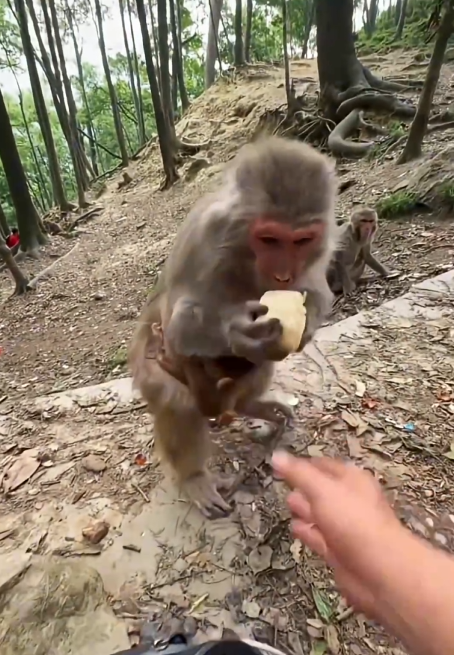
The scene quickly attracted attention. A few villagers who had been watching the interaction from the market edge chuckled quietly. They knew Miko was clever, but they had never seen him react so specifically to spoiled food. It was almost like he had a sixth sense for quality.
Tien tried to redeem himself. He picked up another loaf of bread, this time from a trusted vendor he had bought from many times before. He approached Miko again, holding out the fresh, warm bread. The monkey sniffed it, tapped it lightly, and then—finally—accepted it, nibbling at it with satisfaction. Tien exhaled a sigh of relief, smiling as Miko chattered happily, satisfied with his snack.
From that moment, Tien learned an important lesson. He realized that Miko wasn’t just cute and playful; he was intelligent and discerning. Treating him as just a simple animal would not be enough. Miko deserved respect, attention, and, most importantly, good food.
Word of the incident spread quickly in the village. Soon, children were coming by, curious to see if the monkey would test the bread they brought. Each time, Miko carefully inspected their offerings, sniffing, tapping, and even tossing pieces aside if they were stale or hard. He became something of a food critic, much to the amusement of the villagers.
One day, Tien returned with a basket full of treats: fresh bread, small fruits, and even a bit of sweet rice cake. He had learned from his previous mistake and wanted to make sure Miko was happy. The monkey eyed the basket carefully, testing each item before deciding which to eat first. Tien watched, amazed, as Miko demonstrated not just intelligence but also taste. The monkey had preferences, and he knew exactly what he liked.
As Miko munched happily on the fresh bread, he paused, looked at Tien, and made a soft, approving chirp. Tien laughed, realizing that he and the monkey had formed a silent agreement: mutual respect and understanding. From that day on, Tien always made sure to bring only the best food for Miko, knowing that anything less would be rejected.
The incident had another effect: it taught the other children in the village to be careful with their gifts as well. They began selecting their treats more thoughtfully, paying attention to freshness and quality. Miko, with his keen intelligence, had become a teacher without even trying. He had turned a simple act of eating into a lesson in observation, discernment, and patience.
The clever little monkey also developed a small routine. Each morning, he would perch on his favorite branch and watch the children approach with their offerings. He would inspect carefully, make decisions, and only accept the items that met his high standards. Tien, now a devoted helper and student of Miko’s behavior, often assisted by presenting the food correctly and encouraging the other children to respect the monkey’s preferences.
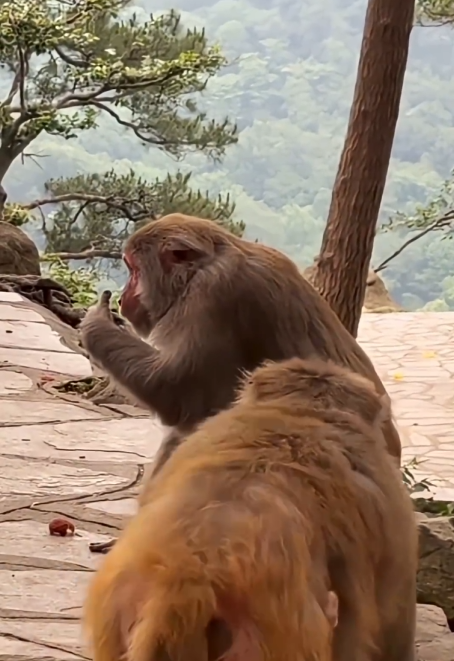
Miko’s smart behavior even caught the attention of the adults in the village. They were amused and impressed, noting how a small monkey could outwit and teach human children. Stories of the little monkey’s cleverness spread to nearby villages, turning him into a local legend. People came from afar just to witness the boy-and-monkey partnership in action.
But the story wasn’t just about cleverness; it was about patience and respect. Tien learned that rushing or assuming Miko would accept anything could backfire. He learned that intelligence isn’t just about performing tricks; it’s about knowing what’s good, what matters, and how to act with care. Miko’s careful assessment of each piece of bread became a mirror for Tien’s own growth. He realized that in life, rushing or taking shortcuts often leads to mistakes, just as giving bad bread led to his embarrassment.
As the days passed, Tien and Miko became inseparable. The boy would carefully select treats, and the monkey would test and approve them. They developed a silent communication system: gestures, glances, and small chirps. It was a partnership built on trust, intelligence, and respect—a bond that went beyond food or play.
Even on days when Tien forgot to bring fresh bread, Miko’s reaction remained consistent. He would gently push the stale bread away, sit back, and look expectantly at Tien. The boy had learned to interpret these signals. He would nod, promise to do better, and make a note to bring fresh treats the next day. Miko’s intelligence had taught him responsibility and care.
By the end of the week, Tien had gained more than a monkey’s approval; he had gained a lesson in humility and awareness. The little monkey had proven that sometimes, even those we consider smaller or weaker can be wiser than us. He had shown that intelligence and discernment can appear in unexpected forms and that respect for all creatures, big or small, leads to mutual trust and happiness.
And so, every afternoon, the village children gathered to watch the little monkey inspect and enjoy his treats. Tien would proudly present the fresh bread, fruits, and sweets, knowing that Miko’s smile—those approving chirps and happy gestures—were worth more than any applause or reward.
The boy had gotten into trouble once for giving bad bread, but he had gained far more in return: a teacher, a friend, and a lesson that intelligence, patience, and respect come in all shapes and sizes. And Miko? He remained the clever, discerning little monkey who could outsmart any human, earning his place as the smartest—and cutest—resident of the village.
😍
